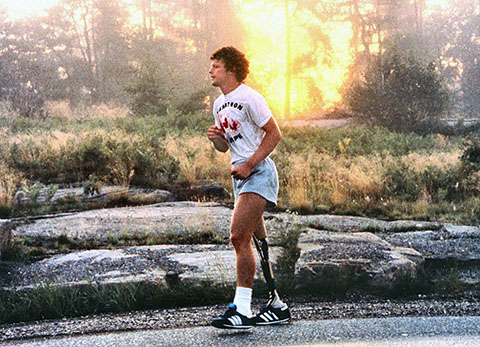 Terrance Stanley “Terry” Fox (July 28, 1958 – June 28, 1981) was a Canadian athlete, humanitarian, and cancer research activist. In 1980, with one leg having been amputated, he embarked on a cross-Canada run to raise money and awareness for cancer research. Although the spread of his cancer eventually forced him to end his quest after 143 days and 5,373 kilometres (3,339 mi), and ultimately cost him his life, his efforts resulted in a lasting, worldwide legacy. The annual Terry Fox Run, first held in 1981, has grown to involve millions of participants in over 60 countries and is now the world’s largest one-day fundraiser for cancer research; over $600 million has been raised in his name.
Terrance Stanley “Terry” Fox (July 28, 1958 – June 28, 1981) was a Canadian athlete, humanitarian, and cancer research activist. In 1980, with one leg having been amputated, he embarked on a cross-Canada run to raise money and awareness for cancer research. Although the spread of his cancer eventually forced him to end his quest after 143 days and 5,373 kilometres (3,339 mi), and ultimately cost him his life, his efforts resulted in a lasting, worldwide legacy. The annual Terry Fox Run, first held in 1981, has grown to involve millions of participants in over 60 countries and is now the world’s largest one-day fundraiser for cancer research; over $600 million has been raised in his name.
Fox was a distance runner and basketball player for his Port Coquitlam, British Columbia, high school and Simon Fraser University. His right leg was amputated in 1977 after he was diagnosed with osteosarcoma, though he continued to run using an artificial leg. He also played wheelchair basketball in Vancouver, winning three national championships.
In 1980, he began the Marathon of Hope, a cross-country run to raise money for cancer research. He hoped to raise one dollar from each of Canada’s 24 million people. He began with little fanfare from St. John’s, Newfoundland in April and ran the equivalent of a full marathon every day. Fox had become a national star by the time he reached Ontario; he made numerous public appearances with businessmen, athletes, and politicians in his efforts to raise money. He was forced to end his run outside of Thunder Bay when the cancer spread to his lungs. His hopes of overcoming the disease and completing his marathon ended when he died nine months later.
He was the youngest person ever named a Companion of the Order of Canada. He won the 1980 Lou Marsh Award as the nation’s top sportsman and was named Canada’s Newsmaker of the Year in both 1980 and 1981. Considered a national hero, he has had many buildings, roads and parks named in his honour across the country.